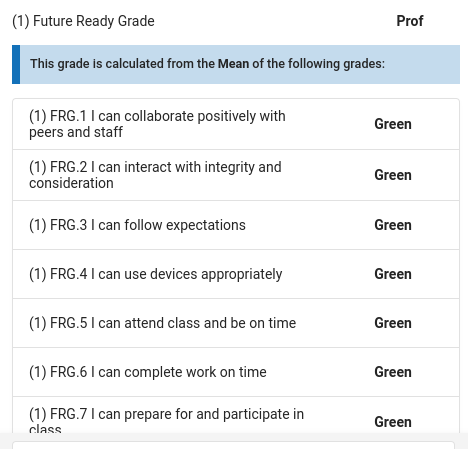Teachers Explain the Need for Future Readiness Grades

November 30, 2019
New Future Readiness Grades impact daily student life, for better and for worse at NHS.
These grades were designed to help students in the long run, Associate Principal Mr. Tim Kachur said.
Grading 12 targets
The 2019 – ’20 school year has changed for students at NHS, one of the major changes is the shift of the Future Readiness Grades, or FRGs. There are now 12 targets students are graded on, and these grades will be going onto students transcripts. These grades are split into three categories based on the main behavior goals students should reach for: Respect, Responsibility and Curiosity. Having 12 grades was a way to eliminate any confusion or undefined targets from the previous College and Career Readiness Grades, Kachur said.
Ironically, this was not originally the plan. The 12 grades were intended to be descriptions for each of the three targets, said Mrs. Sara Bork, a member of the assessment committee in charge of designing FRGs. They were never intended to be assessed. Having 12 grades may be a disturbance to a teacher, having too much on his or her plate. In the end, this will be beneficial for teachers to help show why a student may be struggling in a class.
Grades appearing on transcripts
A major concern amongst students is the appearance of FRGs on transcripts. Administration made this decision because it was important for them to show the difference between academic and behavioral performance, Kachur said. There is often a correlation between the two, and allows students and parents to understand why the child receives a grade, Bork said. If a student knows the material but rarely participates in class, they are now able to still obtain a good grade but drop in their Future Readiness without harming the class grade.
Many students have also been confused about how these FRGs will look on transcripts.
The 12 grades will not show up on the final transcript. A student will receive one FRG for each class, based on all the grades they were given in the 12 areas. This will add quite a bit of length to a students transcript, but it is meant to improve communication Kachur explains.
Effect on release
Another aspect of the FRGs is their effect on release. Currently, they only affect AACP release, not junior and senior release. A students release during the second half of AACP will be taken away if they receive one red in a future readiness grade. This will be checked every three weeks, so a student will have time to change it. Withholding the AACP release from a student will allow the student to seek the help they need, Kachur explains. This remediation period allows students to better their behavior like an athlete would better their technique. It is important to have consequences tied to these grades, as it encourages students and parents to care about their Future Readiness Grade, Bork said.
Colleges and employers
FRGs can greatly impact a students life at NHS, but are colleges and employers looking at these grades?
Yes, colleges are no longer only looking at just grades. ”Universities want to know ‘Who is the whole person I’m getting’ not just ‘What is the number I am getting,’” Kachur said. Each transcript is different, and each high school is different, so it is important to see more than just a grade. Future readiness grades are able to speak for the student. According to the College Board, colleges are looking for many characteristics in a student, including leadership, initiative and responsibility.
As for employers, they are looking for many of the characteristics FRGs assess. According to the Boston University Center for Career Development, companies are looking for employees that can collaborate, be organized and communicate effectively, all things Future Readiness Grades measure.
On the other hand, some universities expressed in the past that they may not be paying close attention to FRGs, Bork warned; however, with the new target based grading system, colleges will have a much easier time referencing Future Readiness Grades, she adds.
Though some colleges may not focus on FRGs, what truly matters is how the grades affect students in high school. “We know that if a student is not turning in their work on time, or not taking charge of their own learning that their not going to be successful in college,” Bork said. The goal is to improve the grades as they move through school, and to be future ready by the time the student reaches college or employment.
“We certainly do believe that this is a student first approach to assessing and learning.” Kachur said.

